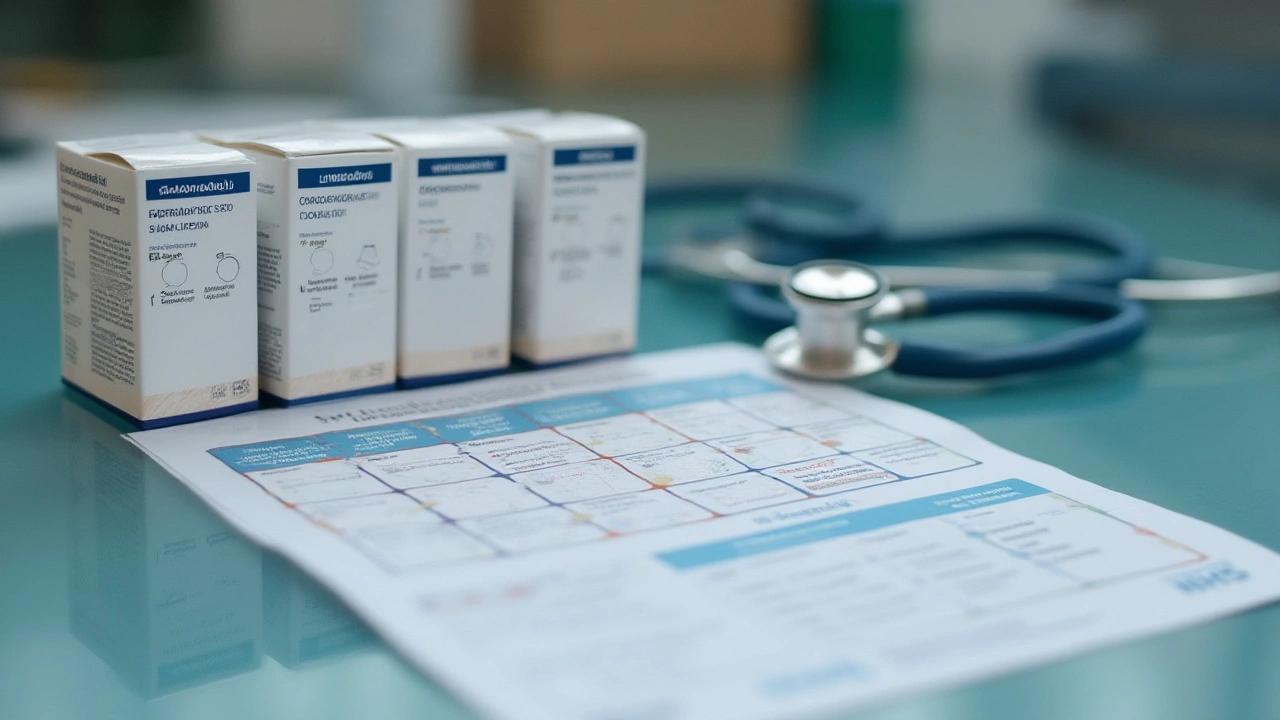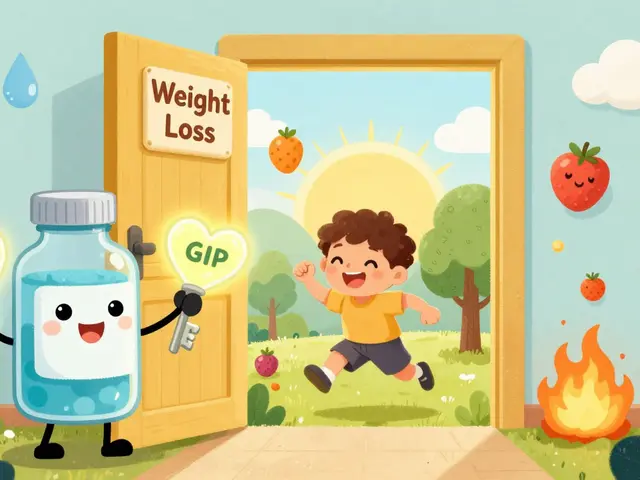If statins like simvastatin used to be your only ticket to lowering cholesterol, you’re probably aware there's a catch. Muscle pain, brain fog, and stubborn side effects force some people to drop simvastatin, leaving them with more frustration than answers. For some, even the needed drop in LDL just doesn’t come. So where does that leave you? Plenty of folks are stuck between the fear of heart disease and a bottle of pills they just can’t tolerate. The good news is: science didn’t stop with statins. Let’s lift the lid on what’s actually working for people today—no hype, just real options that could change your numbers and your everyday life.
Ezetimibe: The Unsung Hero of Cholesterol Meds
Imagine lowering your bad cholesterol without the muscle aches or weird side effects you dreaded with simvastatin. That’s ezetimibe in a nutshell. Approved by the FDA since 2002 and sold under the name Zetia, ezetimibe works differently from statins. Instead of messing with your liver’s cholesterol production, it blocks cholesterol right in your digestive tract. So less cholesterol actually gets absorbed from your food. Here’s a surprising fact: ezetimibe can drop LDL cholesterol by around 18% on its own. That might sound lower than a high-dose statin, but combined with other medications or changes to your diet, it packs a bigger punch.
Doctors like this option for folks who couldn’t get their numbers low enough with statins alone or for those who tried simvastatin and had to quit. Ezetimibe is also in the American Heart Association guidelines as a go-to add-on or stand-alone for those with statin issues. Side effects? Usually, you get a break here. Most people do fine, with only a handful reporting mild stomach upset or joint pain. It's rare to see the severe muscle symptoms that statin-sensitive people dread. Since ezetimibe isn’t metabolized in your liver the same way as simvastatin, it also skips a lot of those drug interactions that can trip you up.
If you like to scan for red flags, here’s what to watch: Some folks with serious liver disease or an allergy to ezetimibe should steer clear—so as always, your doctor needs to know your health history. Also, don’t expect it to lower your cholesterol “triglyceride” number by itself—this drug’s real talent is slashing those LDL scores.
You might also wonder if you’ll have to pop pills every day for results. Short answer: yes. But ezetimibe is just one tiny tablet once a day, with or without food. Some insurance plans cap the price low—just check your benefits before you fill the prescription.
Real tip from the trenches: Some patients stack ezetimibe with the tiniest tolerated dose of a statin. Why? Most people can handle low-dose statins—even if they couldn’t take higher ones—and the combo lets you use less of each drug for a bigger effect, often dodging nasty side effects. And as research keeps rolling in, ezetimibe continues to prove its worth, especially for people at high risk of heart disease who absolutely can’t tolerate statins like simvastatin.

PCSK9 Inhibitors: The New Power Players
This is the story of science going from the lab to your medicine cabinet. PCSK9 inhibitors—names like alirocumab (Praluent) and evolocumab (Repatha)—smashed open a whole new class of cholesterol drugs in the past decade. Unlike older drugs you swallow, these come by injection, usually every 2 or 4 weeks. The shots sound intimidating, but a lot of people simply get used to it, even giving themselves the injections at home.
Here’s the mind-blowing part: PCSK9 inhibitors can drop your LDL cholesterol by 50-60%. That’s double what ezetimibe brings, and sometimes more than statins can even touch. This is life-changing for folks with familial hypercholesterolemia (that’s the genetic, sky-high cholesterol) or anyone who’s already maxed out the cholesterol-lowering effect from diet and oral meds. You don’t miss work, don’t need to fast, just a quick shot, and you’re done for weeks.
How do these work? They target a specific protein in your body (PCSK9) that normally tells your liver to destroy cholesterol catchers called LDL receptors. Block the protein, and your body keeps more of these “cholesterol magnets” around—so your blood clears out bad cholesterol way faster. Think of it as boosting your cholesterol-cleaning power to the next level.
The safety profile is also reassuring. Most people have mild soreness or a bump at the injection site, and that’s it. Some notice flu-like symptoms or cold symptoms now and then. Serious allergic reactions are rare but possible—less common than starting a new statin. PCSK9 inhibitors don't mess with your muscles or liver like simvastatin might, so the crowd who ran into trouble with statins often survives these shots just fine.
But here’s the punchline: price. Even as of July 23, 2025, these drugs are pricey. Yes, the cost dropped in the last few years since their release, but they’re still way more than any daily pill. Some insurance companies require you to try other drugs, prove they failed, or submit paperwork called “prior authorization.” It’s worth it though, for folks who really need a solution when nothing else works.
Quick tip: Ask your doctor about patient-assistance programs. These aren’t just “nice to have”—some people pay as little as $5 a month using these coupon programs. And don’t forget, PCSK9 inhibitors don’t work as magic bullets—they should be paired with a heart-healthy lifestyle, because food and exercise still matter.
One more thing: PCSK9 inhibitors have now shown in clinical trials that they reduce your actual risk of heart attack and stroke, not just your cholesterol numbers. So the benefit isn’t just on paper. That makes it a frontline choice for people with heart disease or those who failed on simvastatin, as confirmed by two of the biggest studies in the field—FOURIER and ODYSSEY.

Bempedoic Acid and Other Alternatives
Bempedoic acid is a name you might not have heard from your neighbor or even your regular doctor—yet. It’s one of the newer kids on the cholesterol block, approved by the FDA in 2020 and sold as Nexletol. Unlike many cholesterol drugs, bempedoic acid acts in the liver, switching off cholesterol production further upstream than statins, which means it doesn’t activate in your muscles, sidestepping the cause of statin muscle pain for most people.
This makes bempedoic acid especially good for someone who’s tried both statins and ezetimibe without luck, or who simply couldn’t stomach simvastatin. The average LDL drop: around 17-28%. This is more than ezetimibe, but less than the big effect from PCSK9 inhibitors. Bempedoic acid is an oral tablet, taken once a day—no needles, no fuss.
Side effects are usually pretty mild. The common ones are tummy trouble, muscle soreness (which is rare), and sometimes a slightly higher risk of gout. Because the drug doesn’t act in the muscles, most statin-sensitive folks get none of that deep muscle ache. The effect on blood sugar and weight gain also seems to be minimal, which is big news for folks with diabetes or prediabetes.
Can you mix it with other cholesterol meds? Actually, yes. Some patients take bempedoic acid with ezetimibe in a single combo pill. This stack can shave LDL cholesterol down by up to 40%, and it’s already on the shelves under the name Nexlizet. This combo option helps when you’re aiming for a low LDL goal in cases where, say, your doctor is treating you for prior heart attack risk or you need to layer up because of that tough family history.
Bempedoic acid isn’t for everyone—pregnant women and those with severe kidney or liver problems have to skip it. It’s smart to watch uric acid levels too, especially if you’re prone to gout.
But what’s the bottom line if bempedoic acid, ezetimibe, and PCSK9 inhibitors all sound like they could work? You don’t have to guess. Doctors have algorithms, and often your medical team will choose what fits your profile and insurance best. If you want even more details on your options, there’s a helpful breakdown here: simvastatin alternatives with clear pros, cons, and comparison tables.
Now, you might come across other cholesterol-lowering drugs—like bile acid sequestrants or niacin—but today’s guidelines barely use them because of limited results or more annoying side effects. Ezetimibe, PCSK9 inhibitors, and bempedoic acid are now the big three for anyone looking to dodge statins like simvastatin and still take charge of their health.





11 Comments
Adam O'Rourke
Oh great, another “miracle” pill list – because the first one didn’t ruin my muscles, right? :) Ezetimibe sounds like the boring cousin of statins, but if you can swallow a tablet without turning into a pretzel, why not? The PCSK9 shots are basically the deluxe upgrade you pay for when you’ve already lost faith in pills. And bempedoic acid? Just another name to add to the ever‑growing pharmacy bingo card. Sure, insurance loves to play hard‑ball, but at least you have options that don’t involve a nightly ache. Good luck navigating the paperwork, champ.
Mary-Pat Quilty
I woudl say that the quest for a statin‑free life is akin to the old Irish sagas where heroes braved storms for a glimmer of hope – only our storm is a bottle of pills and the glimmer is a cleaner LDL number. Ezetimibe, that humble tablet, might not roar like a lion but it whispers sweet relief to those tormented by muscle pain, and that is no small feat. PCSK9 inhibitors, those sleek little syringes, feel like the magic swords wielded by the brave souls who’ve tried everything else – a shot every few weeks, as if the gods themselves were handing out blessings. And then there’s bempedoic acid, the newcomer on the block, promising to silence the muscle‑ache chorus without the statin drama. Imagine the relief of not having to choose between a heart‑healthy life and a life that doesn’t leave you curled up on the couch with a cramp. The Irish spirit, ever resilient, tells us we’ll find a way – perhaps through a combo of ezetimibe and a tiny dose of statin, or maybe a trusty PCSK9 duo. Let us not forget the cost dragons that guard these wonders; insurance labyrinths can turn a hopeful journey into an odyssey. Yet, with patient‑assistance programs like secret leprechaun pots, even these gold‑shiny meds can become affordable. Guidelines from the American Heart Association now list ezetimibe as a first‑line add‑on, while PCSK9 inhibitors sit proudly in the high‑risk category. Bempedoic acid, though newer, has earned a place in the 2024 cholesterol algorithm for those who cannot tolerate muscle‑affecting drugs. Side‑effect profiles differ: ezetimibe rarely stirs the stomach, PCSK9 injections may cause a brief bruise, and bempedoic acid can nudge uric acid levels upward. Lifestyle still whispers its importance – a balanced diet and regular steps are the ever‑present chorus behind any medication. The real magic is in personalising therapy: your doctor will weigh genetics, heart history, and insurance fate before prescribing. So raise a glass of oat‑milk to the myriad options that stand ready, and may your cholesterol fall as gracefully as a ballad’s refrain. May the luck of the Irish guide you to the right prescription.
Patrick McGonigle
Ezetimibe reduces LDL by inhibiting intestinal absorption of cholesterol, typically achieving an 18‑20 % reduction when used as monotherapy. When combined with a low‑dose statin, the effect can increase to approximately 35 %, offering a viable pathway for patients intolerant to higher‑dose statins. PCSK9 inhibitors such as alirocumab and evolocumab bind to circulating PCSK9 protein, preventing LDL‑receptor degradation and can lower LDL by 50‑60 % in most individuals. These agents are administered subcutaneously every two to four weeks, and their safety profile is generally favorable, with injection‑site reactions being the most common adverse event. Bempedoic acid works upstream of HMG‑CoA reductase, activating only in the liver and thereby avoiding muscle‑related side effects; studies report a 17‑28 % LDL reduction. Insurance coverage varies: PCSK9 inhibitors often require prior authorization, while ezetimibe is widely covered as a generic medication. Patient‑assistance programs from manufacturers can reduce out‑of‑pocket costs considerably, sometimes to under $10 per month. Regular monitoring of liver function tests is advisable for bempedoic acid, and uric acid levels should be checked if the patient has a history of gout. Lifestyle modifications-including a Mediterranean‑style diet, consistent aerobic activity, and weight management-remain essential adjuncts to pharmacotherapy. It is prudent to discuss with a cardiologist or lipid specialist to tailor the regimen based on individual risk factors and comorbidities. Adherence to the prescribed schedule maximizes therapeutic benefit and minimizes cardiovascular events. Finally, keep a personal log of LDL measurements and any side effects to facilitate informed discussions during follow‑up appointments.
Keisha Moss Buynitzky
I understand the frustration that accompanies the inability to tolerate simvastatin, and I commend you for seeking alternative options. The therapeutic landscape now includes several agents that have demonstrated efficacy in lowering LDL cholesterol without precipitating the muscle‑related adverse events commonly associated with statins. Ezetimibe, for example, offers modest LDL reduction with a favorable safety profile, while PCSK9 inhibitors provide substantial reductions at the expense of injectable administration and higher cost. Bempedoic acid serves as an oral alternative that circumvents muscle involvement by acting selectively within hepatic tissue. It is advisable to review these alternatives with your healthcare provider, taking into consideration your cardiovascular risk, renal and hepatic function, and insurance coverage. Furthermore, adherence to a heart‑healthy diet and regular physical activity can augment the pharmacologic effects and contribute to overall cardiovascular well‑being. Please feel free to reach out should you require additional clarification on any of these therapeutic options.
Shivam yadav
From my experience, many patients who can’t stay on simvastatin find a lot of comfort in a step‑wise approach. Starting with ezetimibe, which is easy to take and has minimal side effects, often paves the way for adding a low‑dose statin later if tolerated. If that still isn’t enough, moving to a PCSK9 inhibitor can give that extra LDL drop without the muscle pain. And for those preferring an oral option, bempedoic acid works nicely and avoids the injection hassle. It’s also worth checking whether your insurance offers any subsidy programs for these newer drugs – they can make a big difference. Ultimately, the best plan is the one that fits your lifestyle and health goals, so talk it through with your doctor and we’ll find the right combination together.
pallabi banerjee
Building on what was just said, it is helpful to remember that combination therapy often yields the greatest LDL reduction. A typical regimen might include ezetimibe 10 mg daily together with bempedoic acid 180 mg, which together can achieve approximately a 40 % decrease in LDL levels. Monitoring labs every three months is advisable to ensure both efficacy and safety, especially checking liver enzymes and uric acid. Patients should also be reminded to maintain consistent dietary habits, as fluctuations can affect lipid panels. If cost becomes a barrier, many pharmacies provide discount cards that can lower the price of these generics significantly. Sharing these strategies with others facing similar challenges can foster a supportive community and empower patients to take charge of their cardiovascular health.
Alex EL Shaar
Alright, let’s cut the fluff. The article tries to sound like a miracle brochure, but it’s basically a list of pricey meds with a sprinkle of “talk to your doctor.” First, ezetimibe is a generic that barely moves the needle – 18 % LDL drop isn’t exactly a blockbuster. PCSK9 inhibitors? Yeah, they’re effective, but the price tag will make your wallet weep, and the injection routine is a hassle for anyone not already squeamish about needles. Bempedoic acid sounds fancy, yet the data shows only moderate LDL reductions and a possible uptick in gout risk – not exactly a win. Let’s not forget the ever‑present insurance red‑tape; prior authorizations are a nightmare, and many patients end up paying out‑of‑pocket or abandoning therapy altogether. If you’re looking for real value, focus on lifestyle changes – diet, exercise, weight loss – that cost nothing and work synergistically with any meds you’re forced to take. In short, the “new options” are just a repackaging of the same old problem: high cost, limited access, and a reliance on pharmaceutical fixes rather than holistic health management.
Anna Frerker
American meds are overpriced crap, who needs 'em?
Julius Smith
Honestly, the price tag can be a real pain, but those PCSK9 shots actually save lives – 💉💰🚀.
Brittaney Phelps
Keep pushing forward – every small step, whether it’s taking your medication correctly or adding a short walk, adds up to a healthier heart.
Kim Nguyệt Lệ
When discussing bempedoic acid, it is important to note that the drug is marketed under the name Nexletol, not “Nexlezit” as occasionally misstated; proper terminology ensures clear communication among healthcare professionals.